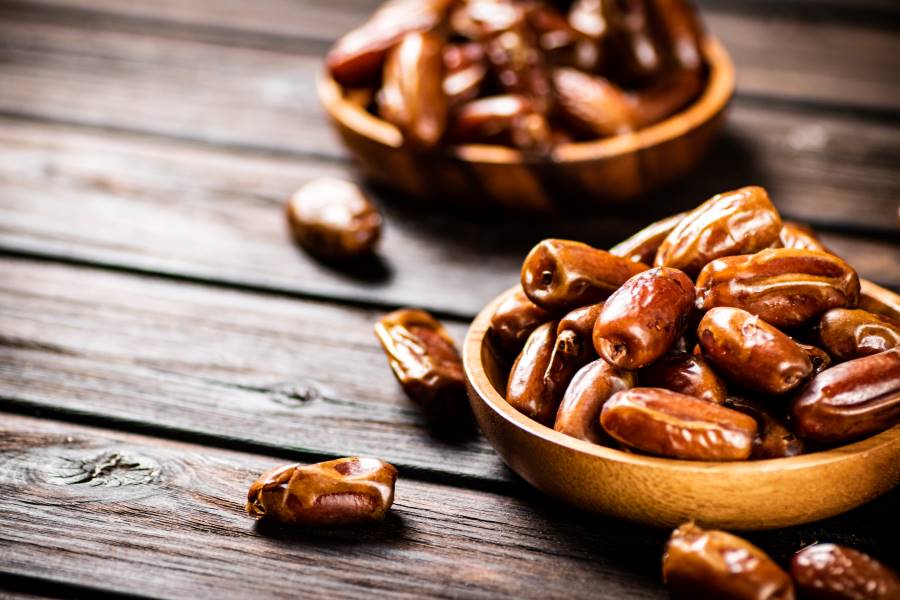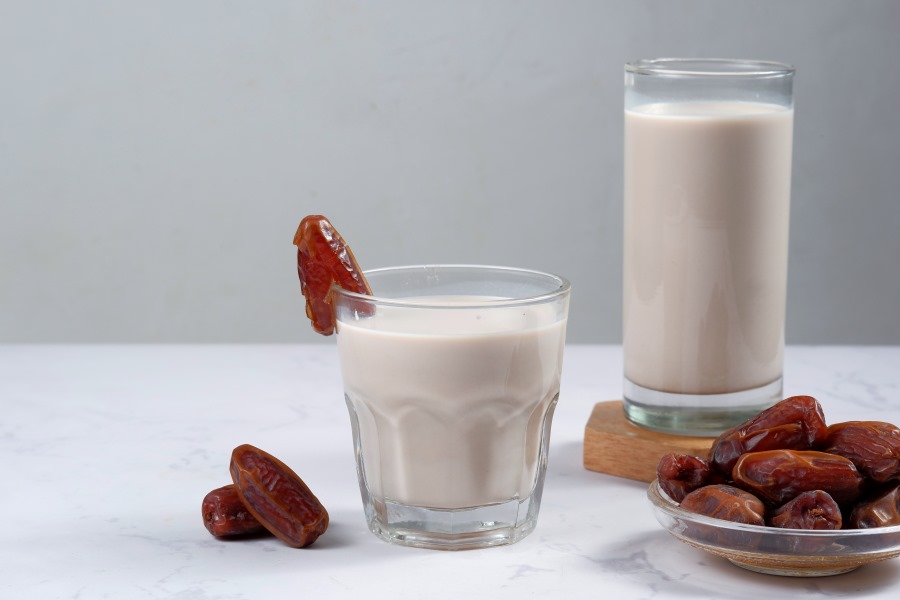10 Amazing Proven Health Benefits of Dates

Are you looking for healthy food items to add to your daily diet? Why not try dates?
Dates are enriched in nutritional contents and help to protect health in various ways. The fruit of the date palm tree is available in fresh or dried form. The Medjool and Deglet Noor are the most commonly consumed variants of dates.
Read on to know about the benefits of eating dates!

Table of Contents

Top 10 Health Benefits of Dates

Dates are sweet, chewy fruits packed with essential nutrients and health benefits. The top health benefits of dates are discussed in detail below:
1. Fights Diseases
Dates have a high amount of antioxidants that reduce the risk of various diseases. Antioxidants protect cells from unstable molecules, which can cause harmful reactions in the body and lead to disease.
The most potent antioxidants in dates include Flavonoids, Phenolic Acid, and Carotenoids. Flavonoids reduce inflammation, risk of diabetes, Alzheimer's disease and specific kinds of cancer. Phenolic Acid lower the risk of heart disease and cancer. Lastly, Carotenoid minimizes eye-related disorders, including macular degeneration.
2. Supports Digestive Health
Consumption of dates aids in bowel movement due to the high presence of fibre content. Individuals who take dates for a week can ensure significant improvement in regular bowel movements.
In addition, consumption of dates on a regular basis lowers the concentration of Ammonia in the stool. Thus, it is clear that individuals can guarantee improved digestive health by eating dates.
3. Promotes Brain Health
Dates help in reducing inflammatory markers, including Interleukin 6 in the brain. High levels of these markers can increase the risk of diseases such as Alzheimer's. Many studies and researches have been conducted regarding the health benefits of dates.
Some animal studies show that dates can lower the effects of amyloid beta protein which leads to plaque formation in the head. Dates have brain-boosting properties (thanks to the presence of a high level of antioxidants), which help to lower inflammation. However, further human studies are required to prove these statements.
4. Improves Bone Heath
Dates contain minerals including potassium, calcium, phosphorus and magnesium. All these minerals have the power to eliminate the chances of developing bone-related diseases such as Osteoporosis.
Now that individuals know the health benefits of dates, let's learn about the nutritional value of this food item.
5. Boosts Immune System
Dates contain various antioxidants, including flavonoids, carotenoids, and phenolic acid, which help strengthen the immune system and protect the body against infections.
6. Enhances Skin Health
The vitamins and antioxidants in dates promote healthy skin by reducing inflammation, preventing oxidative damage, and supporting collagen production for a youthful complexion.
7. Supports Pregnancy and Labour
Eating dates in the later stages of pregnancy may help ease labour by promoting cervical dilation and reducing the need for induced labour, thanks to their natural compounds.
8. Rich in Nutrients
Dates are packed with essential nutrients, including vitamins (B vitamins, vitamin K), minerals (potassium, magnesium, calcium, iron), and antioxidants, making them a nutritious snack.
9. Natural Energy Booster
Dates contain natural sugars like glucose, fructose, and sucrose, providing a quick and sustained energy boost, making them ideal for a pre or post-workout snack.
10. High in Fibre
Dates are an excellent source of dietary fibre, which aids in digestion, helps prevent constipation, and promotes regular bowel movements for overall digestive health.
What are the Nutritional Values of Dates?
The nutritional value of a 100 gm serving of dates (3.5 ounces) is as follows:
Note: Individuals can eat 100 gm or a handful of dates per day.
Individuals willing to add the nutritional values of dates to their daily meals can do so in certain ways, as mentioned in the next section.
Stay on Track with These Health Tools
How to Include Dates in Your Daily Diet?

Here are explained different ways to include dates in meals:
1. Add Baked Dates to Cakes
You can chop dates and bake them in cakes, cookies, bread, or muffins. They pair well with spices like cinnamon and nutmeg, enhancing the overall taste. Dates also blend seamlessly into batters, ensuring a smooth texture.
2. Put Dates in Stuffing
Make a stuffing of dates along with almond cream cheese or goat cheese. If you are using cream cheese, you can add walnuts to the whole mixture or herbs and some garlic to goat cheese.
3. Make a Wrap
You can stuff dates with almonds and make a wrap with half a piece of bacon or prosciutto. Then, you can secure the wrap with a toothpick. Bake or pan-fry these wraps until the bacon or prosciutto is crispy for an irresistible treat.
4. Add Dates to Salads
It is one of the easiest ways to add dates to your meal. All you have to do is to add chopped dates to a salad. Dates can also be used in grain salads, like quinoa or couscous, adding depth and richness.
5. Prepare a Smoothie
You can easily prepare a smoothie by adding dates along with other fruits such as mango, orange, banana, coconut milk, kiwi, and walnuts. Dates act as a natural sweetener, eliminating the need for added sugars.
As individuals are aware of the advantages of eating dates, they must also know the risks associated with date consumption. Read on!
What are the Side Effects of Overeating Dates?
While dates are highly nutritious and beneficial, overeating them can lead to some side effects. There are several side effects or risks of eating dates in excess.
- Increased Blood Sugar: Dates contain a high amount of natural sugar. Hence, excessive eating of dates can increase blood sugar levels.
- Weight Gain: Dates are calorie dense food items. Therefore, when individuals start taking a high amount of dates, it can result in weight gain.
- Allergies: Dried dates can contain sulfites that can lead to allergic reactions among individuals. Though the symptoms can vary, usually individuals experience skin allergies.
- Digestive Issues: Overeating dates can lead to digestive problems such as bloating, gas, and diarrhoea due to their high fibre content. Excessive fibre can disrupt normal bowel function.
- Nutrient Imbalance: Eating too many dates can lead to an imbalance in nutrient intake, as they may displace other important foods from the diet, affecting overall nutrition.
- Heartburn: Overeating dates may lead to heartburn or acid reflux in some people, as they are acidic and can exacerbate symptoms of gastrointestinal reflux disease (GERD).
- Fatigue: The high sugar content in dates can cause a rapid spike in blood sugar followed by a crash, which may lead to feelings of fatigue and lethargy.
- Nutrient Toxicity: While rare, excessive consumption of dates might lead to nutrient toxicity, especially if taken with supplements or other foods high in similar nutrients.
Who Should Avoid Eating Dates?
Below are discussed certain conditions during which individuals must not eat dates.
- People with Diarrhoea and Sorbito: Individuals suffering from diarrhoea should not eat dates. Dates contain a high amount of sugar alcohol named sorbitol, which increases bowel movement. Hence, consuming dates during this time can prove to be harmful.
- People with Diabetes: Individuals with IBS or sensitivities can avoid dates due to the presence of high fructose. Dates are rich in fructose, which can cause digestive distress in individuals with fructose intolerance.
- People Suffering from Kidney Stones: Persons suffering from kidney disease must avoid or limit date consumption due to high potassium. Hyperkalemia can cause symptoms such as muscle weakness and fatigue.
- Pregnant Women with Gestational Diabetes: Expectant mothers with gestational diabetes should limit dates due to their potential impact on blood sugar levels. Overconsumption of dates could exacerbate gestational diabetes.
- Overweight Individuals: High-calorie content in dates can contribute to weight gain, making them less suitable for those trying to manage their weight. Moderation is vital to enjoying the benefits of dates without negatively impacting weight management goals.
- People Suffering from Migraines: Dates contain tyramine, which can trigger migraines in susceptible individuals, making them a potential risk factor. Monitoring and limiting tyramine intake can help reduce the frequency and severity of migraine episodes.
- Individuals on Certain Medications: Those taking medications that affect potassium levels should be cautious with dates to avoid interactions. It's essential for individuals on such medications to consult their healthcare provider before incorporating dates.
From the above sections, one can clearly understand the benefits of eating dates. Consume the required amount of dates and improve bone and gut health. Dates are a delicious and nutrient-dense fruit, offering a variety of health benefits, from improved digestion to better heart health. Overall, dates can enhance your diet and well-being when enjoyed responsibly.
Protect What Matters - Explore Other Insurance Options














